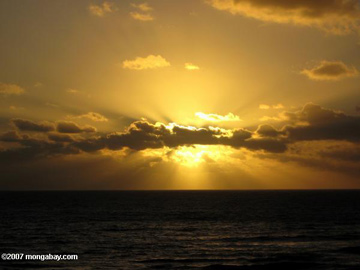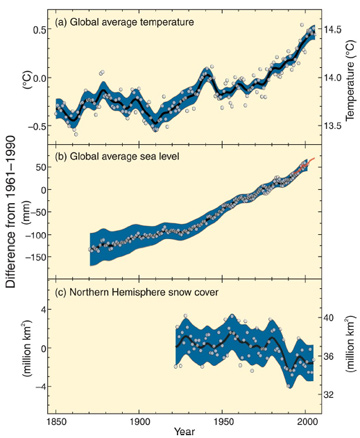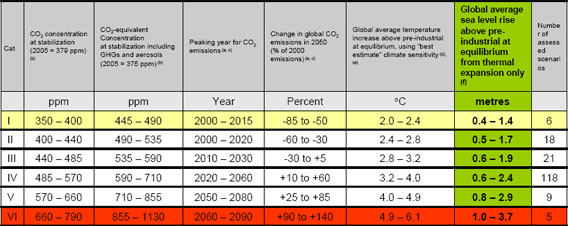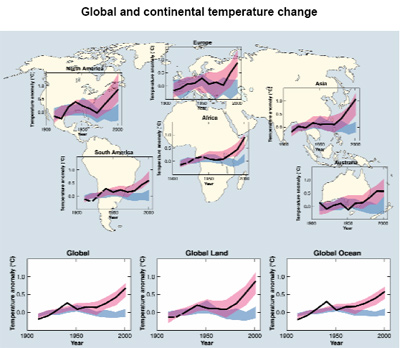Hope in Bali: the December Meetings on Climate Change
Hope in Bali: the December Meetings on Climate Change
Jeremy Hance, special to mongabay.com
Opinion
November 28, 2007
The fourth, and final, report from the Intergovernmental Panel on Climate Change (IPCC) painted the most irrefutable and sobering picture yet of global warming. Two thousand scientists from over one hundred countries agreed to the statement that “warming of the climate system is unequivocal, as is now evident from observations of increases in global average air and ocean temperatures, widespread melting of snow and ice, and rising global average sea level”. The report also stated that it was more than 90% certain that global warming is due to human activity. This report, released last week, will hopefully set the tone for the two week meeting in Bali, Indonesia on climate change and create the rapid and strong responses that are required.

|
A change has come over our society in the last few years: global warming and other environmental issues have begun to make their way into mainstream life. Environmentalists and greens are no longer viewed by the masses as fringe radicals, but canaries in the coal mine. While minds are changing regarding climate change—and our relationship to the earth in general—we must use this shift in sensibilities to do what has not been done yet on climate change, namely take action. We are at a crux. The media still underplays the seriousness of climate change, and ignores many other environmental issues both global and local. World leaders still use the economy as an excuse to do little or nothing, as though humanity is incapable of making economic sacrifices or the government of implementing creative plans that aid the climate without hurting the economy. Finally citizens still remain uneducated and overwhelmed by the issue, allowing most to ignore global warming altogether and do nothing to change wasteful destructive habits. The global media, our leaders, and the citizens all have the responsibility to create real and effective change. December 3rd in Bali is the time to finally begin.
The Media and the Skeptics
 Courtesy of the IPCC. |
American media is obsessed with the Middle East and terrorism—possibly as much as our executive branch. Yet, while we have spent the past six years focusing this nation’s vast resources, energy, money, and media on the Middle East and a botched war in Iraq, our entire natural world has experienced large and disturbing shifts. Already we have seen the conflict in Dafur intensified by long-term droughts, extinction of species due to rising temperatures, large-scale changes in seasonal migrations, and already massive melting—for example, the Northwest Passage was navigable this year for the first time. This is just the beginning. Even moderate climate change will bring with it regional famines, increased warfare, less access to water, massive extinction of species, rises in ocean levels, and increased storm intensity. If the temperature rises enough whole environments may change: the arctic could melt, the Amazon become grasslands, the great plains a dustbowl, and oceanic coral reefs may be nothing more than acidified graves. So, in light of these facts, which possesses more threat to global stability: conflict with (and within) the Middle East or climate change? To me the answer is obvious. This is not meant to undermine the importance of finding peaceful resolutions in the Middle East, but merely to point out that the instability posed by problems in the region is a mere sideshow when faced with the changes global warming is bringing.
Most media sources have now acknowledged both the reality of global warming and the need to act on it. Yet, the coverage of climate change—not to mention innumerable environmental issues—is still weak and lacking. Rarely does climate change reach the front page, at least in comparison to the war in Iraq, the instability of Afghanistan, the entire Middle East, the primaries, and the economy. And perhaps the most concerning aspect is the almost total lack of investigative reporting on climate change. Certainly, the IPCC report was in every paper, but after the article on the report the issue was dropping in most media sources. Far more energy, space, and funds seem to go to the entertainment and sports section than climate change or environmental news. And even more ridiculous: some news organizations are still presenting climate change skeptics as somehow possessing as much proof on their side as the IPCC, as though the issue remains undecided. I remember watching Fox News a year ago when they had an expert on to discuss climate change. This expert wasn’t a climatologist or even a scientist, in fact he was just a conservative representative, yet they presented his beliefs’ on climate change as an expert’s. They ended the interview by laughing about how if climate change occurs we’d all get to wear more summer outfits. This lack of responsibility to the public is staggering.
Of course there are, and will continue to be, detractors of climate change. But it is telling that in the last few years—as the evidence has become inconvertible—that a skeptic as stubborn as President Bush has been forced to admit that climate change is real and that it is caused by human activity. As well, other professional skeptics have begun to shy away from arguing that climate change is not happening to arguing about its causes. I wish deeply that these skeptics had been right. A world without climate change would be a far better one to live in. But instead these skeptics have only succeeded in greatly harming our world by mendacious arguments that have served to delay appropriate action. Even if the skeptics had been proven to right what great harm would it have caused to work for cleaner technologies, renewable resources, and environmental awareness decades ago rather than waiting till today to see such issues become mainstream? In the end what were skeptics arguing against but creating a better world with or without climate change? Though, to cut these skeptics some slack, perhaps they were just afraid. Only their fear—rather than leading to positive action—led them to increasingly histrionic denial.

Global and Individual Solutions
A large part of this fear is due to the fact that when looked at from the individual level climate change seems insurmountable. We are already being told by the scientists and the media that no matter what we do, we will feel some effects of climate change. While this casts a fatalistic, almost hopeless, glare on the issue, some effects’ and all’ are very different. It is not as though we do not know what needs to happen, nor is it that there are not coherent and achievable plans for lessening climate change. In fact, how to prevent global warming may be one of the most brainstormed about issues of all time—what we lack is the will to implement such changes here and now. So far this duty has been shirked: by governments, the media, and the larger citizenry. Because the problem has taken decades to shape itself, most of our leaders and reporters feel as though it is far easier to pass the buck on to whoever comes next. Yet there are many steps that can be taken immediately to alleviate climate change. For example, 15-20% of global climate change is due to deforestation, especially in the tropics. If these forests were protected full-stop rather than exploited that would provide a massive lessening in our annual carbon output. One idea, under discussion, is to pay tropical nations to preserve forests as carbon sinks. If done rightly, such a scheme could rapidly lessen the carbon released annually. Many more ideas are on the table just waiting to be implemented.
For more personal solutions, we must look outside the box and see that societal change is also necessary. For too long the western world has held the mentality that we could feed the most gluttonous material desires in history without consequence; our very vision of a meaningful life has become one in which material possession and large-scale wealth is paramount. Yet everything we purchase, everything we consume, requires resources and energy. To change the amount of consumption new technologies and mitigating waste will prove invaluable, but I believe we must also take stock of our materialism. This may be a sacrifice to some, but in the end I don’t think they should find it to be a very large. In fact by replacing our materialistic goals with other pursuits—community, faith, education, generosity, family, nature, etc.—I think we will find that to own less is no sacrifice at all, but rather a freedom.
The Meeting in Bali
Some may believe I am shrilly overreacting and that somehow I am threatening the world through my desire to make our society sustainable and protect ecosystems as they are. But when the IPCC report states that within thirteen years up two hundred and fifty million Africans may face water shortages, when it states that the heavily populated coastal areas of Asia will see widespread flooding and increasing storms, when it states that significant biodiversity loss could occur around the globe (and already is occurring), when it states that rain-fed agricultural yields may be halved, it is then that I feel I am not reacting strongly enough. Others will counter that one should not listen to the IPCC. They will state that that UN has purposefully exaggerated the warming and threats. For what reason, I am not sure—something about wanting to control the American economy or to not allow third world nations to grow economically. It seems strange then that it was third world nations who were courageously pressing for stronger wording in the IPCC’s report.
 Comparison of observed continental- and global-scale changes in surface temperature with results simulated by climate models using either natural or both natural and anthropogenic forcings. Decadal averages of observations are shown for the period 1906-2005 (black line) plotted against the centre of the decade and relative to the corresponding average for the period 1901-1950. Lines are dashed where spatial coverage is less than 50%. Blue shaded bands show the 5-95% range for 19 simulations from 5 climate models using only the natural forcings due to solar activity and volcanoes. Red shaded bands show the 5-95% range for 58 simulations from 14 climate models using both natural and anthropogenic forcings. |
If we cannot trust a massive international body involving research from thousands of scientists, who do we trust? Should we trust the few skeptics left, many of whom are not experts? Or should we trust the oil and coal industries, since they have no ulterior motives? Obviously, there is no question that climate is incredibly complex and that we cannot possibly know everything. There is also every possibility that aspects of the IPCC report may prove to be mistaken (this is why the entire report is made up of probabilities), but because climate is a complex system and science imperfect does not mean we know nothing. We know a lot—more than enough to act.
The evidence for global warming is there (and no longer questionable). The possible outcomes are well-known. And the solutions are here. Now, what we need is action by those who have so far been lacking and dithering. The governments of every nation need to take climate change as the most significant long-term threat to their nation’s stability, quality of life, and safety. We need courageous policy leaders who are not afraid to demand change and sacrifices from the corporate and civilian sectors. We need leaders who do not fear implementing the necessary regulations to deal with the issue at hand. And we need governments that will hold other nations accountable for dragging their feet, or promising one thing and delivering another. If nations such as the United States and China continue to balk at scientific findings, if they continue to put short-term monetary wealth above the well-being of their citizens than it is up to other nations to take a stand. Smaller, poorer nations should band together with wealthier, more enlightened countries to make their voices heard loud and clear. They will not go unsupported: while the governments of the US and China may wish for wealth and warming, many of the citizens of these nations understand the stakes of climate change and are horrified by their country’s inaction.
Bali is the time for the world to tell blind and delaying governments that we will wait no longer for action. That drastic action must be taken here and now. History has shown time and again that people will rise up to complex, threatening problems if their leaders are not afraid. But history has also proven the consequences of non-action and incoherent squabbling when what is required is communal action. While we are not the first civilization to be threatened by environmental disaster, this is the first time in human history in which our actions threaten the whole world as we know it. The world will not end with climate change, nor will human civilization. But it will be a lonelier, bleaker earth; one filled with strife and competition; the value of life—both human and non-human—will be lessened. Will we really risk such things, because we are too comfortable to change our ways, to sacrifice, to challenge some of our deeply held views? Will we allow a few blind self-serving governments to threaten our future? Is our material wealth really worth more than our children’s quality of life?—and by quality of life I mean the greater pursuit of happiness for all: to live in a world that grants security, the essentials for life, and a place as beautiful and hallowed as the one in which we have been fortunate enough to inherit.
The stability of our nations, the future happiness of our species, and the welfare of every living thing is dependent on how nations respond. Now is the time.